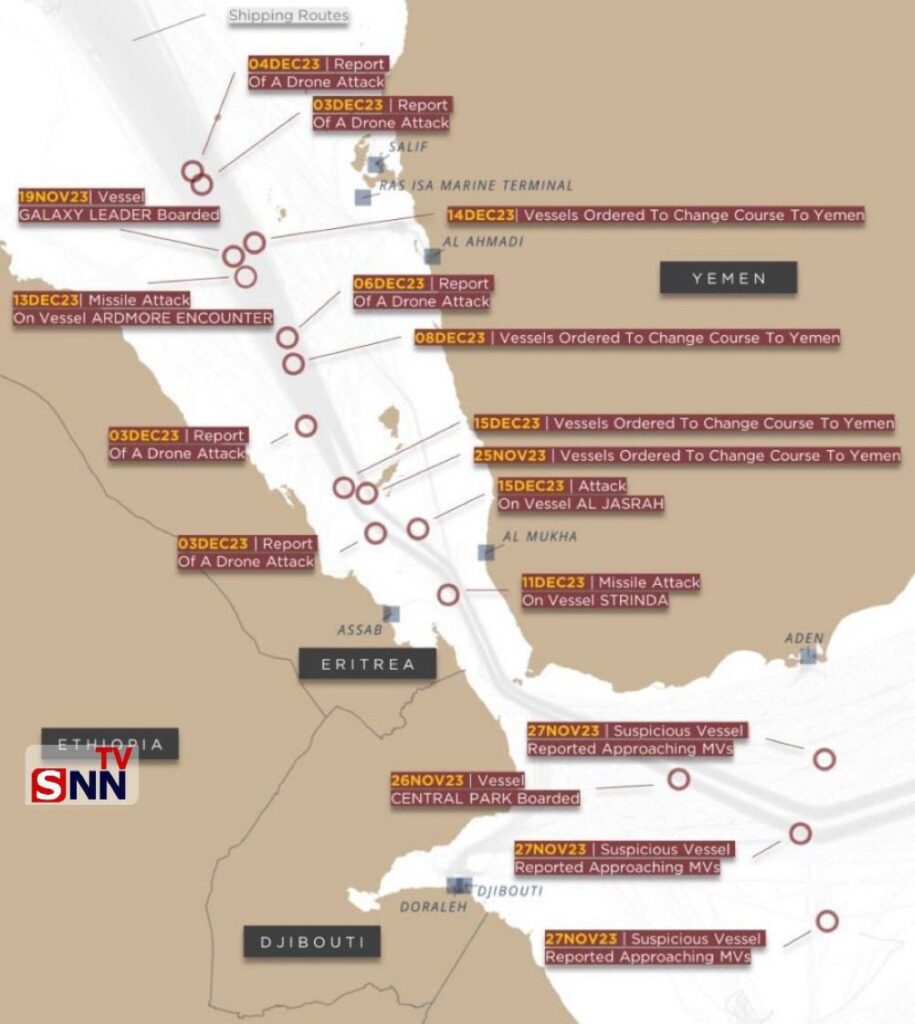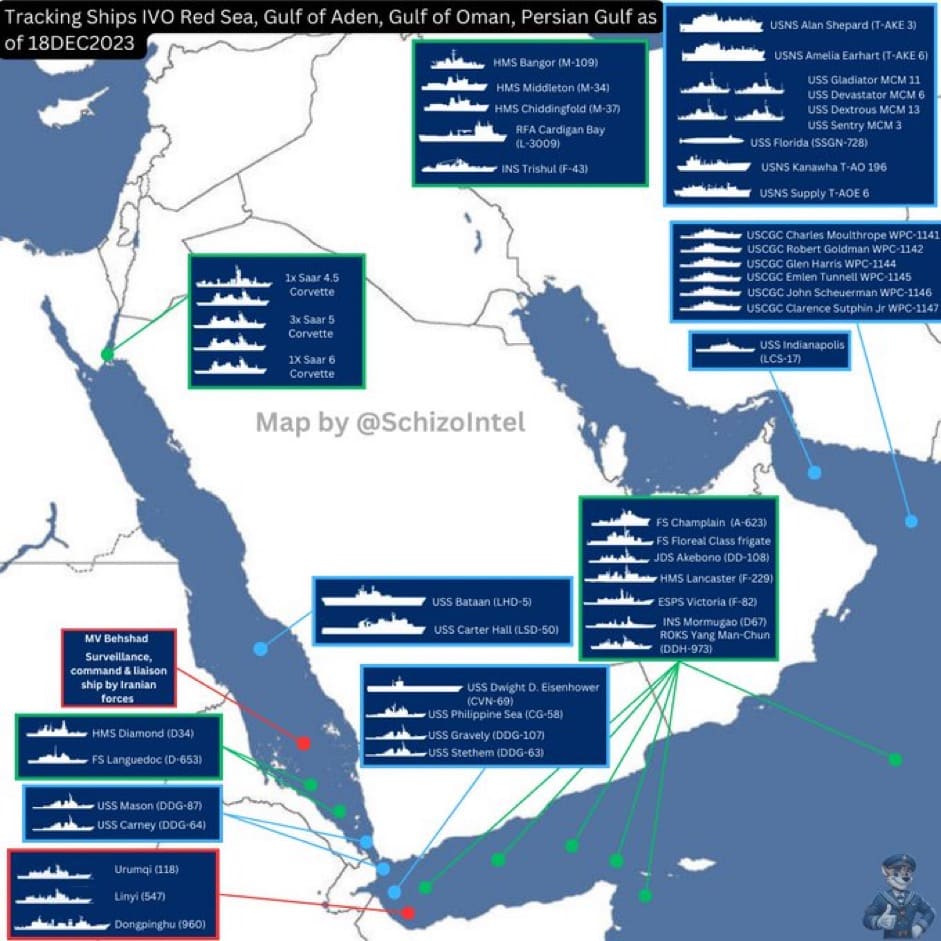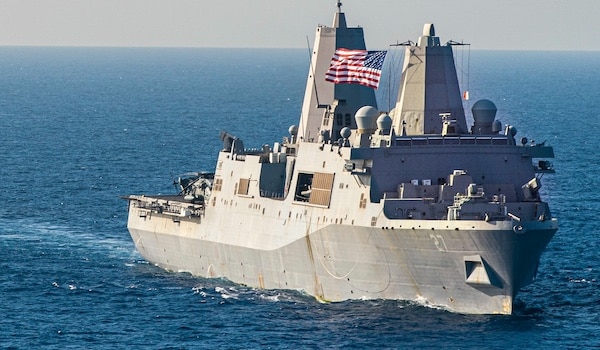Long before it hit mainstream news headlines in the last few days, a conflict has been raging in the Red Sea which could transform Israel’s war on Gaza into a regional conflict. In mid-October, the Houthi movement in Yemen, which controls much of the country, fired drones and cruise missiles at Israel. It took the firepower of the USS Carney, a U.S. warship in the Red Sea, to stop the missiles hitting their target.
The exchange was fleetingly reported in the Western press, but what was not reported was that the battle took place over eight hours. A subsequent missile battle lasted even longer, nine hours.
In the meantime, Houthi missiles have had to be intercepted in outer space, the first ever such encounter, by Israeli defence systems. But it’s what is happening in the sea lanes on the planet below, rather than explosions in space, that is altering the dynamic of the Gaza war.
Yemen commands the access to the Red Sea which itself leads to the Suez Canal. This carries 15% of global shipping. The Houthis are currently stopping all shipping heading to Israeli ports until aid is delivered to Palestinians in Gaza. In a daily series of actions (see map 1) they have redirected tankers and freighters which are Israel bound. They have boarded, captured, and fired missiles at ships that do not respond to their instructions.

The campaign has been devastatingly effective. The world’s largest shipping firms, including Maersk, Belgium’s Euronav, Taiwan’s Evergreen, and Germany’s Hapag Lloyd have abandoned the Red Sea route. So has oil giant BP. The alternative route around South Africa adds thousands of miles, weeks of time, and millions of pounds to shipping costs. Container shipment prices, oil prices, and marine insurance rates are already on the rise.
In response, the United States has launched a whole new military alliance: Operation Prosperity Guardian. Its allies include the UK (without parliamentary agreement), France, Italy, Spain, Bahrain, and the Seychelles. Netanyahu is threatening President Biden that if the U.S. does not act against Yemen, then Israel will. The U.S. aircraft carrier Eisenhower is now in the area, adding to the already substantial Western armada in the sea lanes (see map 2). Both British and French ships have been engaged in firefights with the Houthis.

Escalating war
The widening of the conflict, which the anti-war movement warned against from the very start of the war on Gaza, is replete with dangers. The Houthis are allied with Iran, and this conflict threatens to break the agreement between Iran and the U.S. to stay out of the Gaza conflict. Even more seriously from the US’s point of view, the Houthis will not be an easy opponent. They are battle hardened by their years-long war with Saudi Arabia, a war which even the Western-armed Saudis have had to admit is a failure. Indeed, both the Saudis and the UAE have refused the U.S. invitation to join Operation Prosperity Guardian, because it threatens the uneasy truce with the Houthis. In any case, the Houthis have threatened to hit Saudi oil fields in retaliation for any action taken against them.
And any widening of the conflict in the Red Sea will have other repercussions. A second under-reported conflict in southern Lebanon has been accelerating in recent weeks. Hezbollah has been engaged with the Israelis since the start of the Gaza war. But in the last few days, the Israeli Minister of War has told the Iran-allied group to withdraw from southern Lebanon or the Israeli military will attack them. This, combined with the deterioration of the situation in the Red Sea, will increase the likelihood of Iran agreeing to support a more offensive strategy by both the Houthis and Hezbollah.
Finally, and again massively under-reported, the Iraqi resistance, under a pro-Iranian Iraqi government, has been carrying out a sustained campaign of attacks on U.S. bases both in Iraq and Syria. In many ways, the U.S. is now seeing the Iraq War chickens coming home to roost. It lacks the allies it once had, and some retained allies are now very nervous about the widening conflict. Its enemies are both ideologically and actually battle hardened against it. And Israel, its garrison state in the Middle East, under the extreme-right leadership of Netanyahu, is more difficult to control than ever before.
In the wider world, the U.S. is bleeding credibility with everyone but its most servile allies, as successive UN votes have demonstrated. And the popular revulsion at what Israel is doing with U.S. encouragement is already at levels only previously reached in opposition to the Vietnam and Iraq wars.
The stakes in this conflict are much higher than they were when it began. It is an existential conflict for Gazans, possibly for all Palestinians. But it now seems that it poses similar threats for many millions more.

